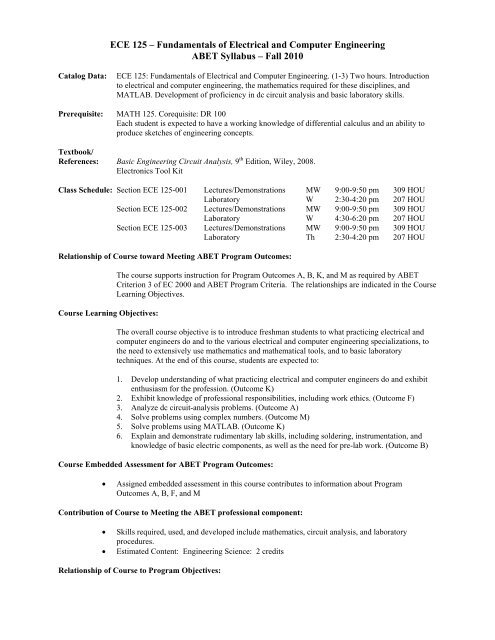ECE 125 â Fundamentals of Electrical and Computer Engineering ...
ECE 125 â Fundamentals of Electrical and Computer Engineering ... ECE 125 â Fundamentals of Electrical and Computer Engineering ...
ECE 125 – Fundamentals of Electrical and Computer EngineeringABET Syllabus – Fall 2010Catalog Data:ECE 125: Fundamentals of Electrical and Computer Engineering. (1-3) Two hours. Introductionto electrical and computer engineering, the mathematics required for these disciplines, andMATLAB. Development of proficiency in dc circuit analysis and basic laboratory skills.Prerequisite: MATH 125. Corequisite: DR 100Each student is expected to have a working knowledge of differential calculus and an ability toproduce sketches of engineering concepts.Textbook/References: Basic Engineering Circuit Analysis, 9 th Edition, Wiley, 2008.Electronics Tool KitClass Schedule: Section ECE 125-001 Lectures/Demonstrations MW 9:00-9:50 pm 309 HOULaboratory W 2:30-4:20 pm 207 HOUSection ECE 125-002 Lectures/Demonstrations MW 9:00-9:50 pm 309 HOULaboratory W 4:30-6:20 pm 207 HOUSection ECE 125-003 Lectures/Demonstrations MW 9:00-9:50 pm 309 HOULaboratory Th 2:30-4:20 pm 207 HOURelationship of Course toward Meeting ABET Program Outcomes:Course Learning Objectives:The course supports instruction for Program Outcomes A, B, K, and M as required by ABETCriterion 3 of EC 2000 and ABET Program Criteria. The relationships are indicated in the CourseLearning Objectives.The overall course objective is to introduce freshman students to what practicing electrical andcomputer engineers do and to the various electrical and computer engineering specializations, tothe need to extensively use mathematics and mathematical tools, and to basic laboratorytechniques. At the end of this course, students are expected to:1. Develop understanding of what practicing electrical and computer engineers do and exhibitenthusiasm for the profession. (Outcome K)2. Exhibit knowledge of professional responsibilities, including work ethics. (Outcome F)3. Analyze dc circuit-analysis problems. (Outcome A)4. Solve problems using complex numbers. (Outcome M)5. Solve problems using MATLAB. (Outcome K)6. Explain and demonstrate rudimentary lab skills, including soldering, instrumentation, andknowledge of basic electric components, as well as the need for pre-lab work. (Outcome B)Course Embedded Assessment for ABET Program Outcomes:• Assigned embedded assessment in this course contributes to information about ProgramOutcomes A, B, F, and MContribution of Course to Meeting the ABET professional component:• Skills required, used, and developed include mathematics, circuit analysis, and laboratoryprocedures.• Estimated Content: Engineering Science: 2 creditsRelationship of Course to Program Objectives:
<strong>ECE</strong> <strong>125</strong> – <strong>Fundamentals</strong> <strong>of</strong> <strong>Electrical</strong> <strong>and</strong> <strong>Computer</strong> <strong>Engineering</strong>ABET Syllabus – Fall 2010Catalog Data:<strong>ECE</strong> <strong>125</strong>: <strong>Fundamentals</strong> <strong>of</strong> <strong>Electrical</strong> <strong>and</strong> <strong>Computer</strong> <strong>Engineering</strong>. (1-3) Two hours. Introductionto electrical <strong>and</strong> computer engineering, the mathematics required for these disciplines, <strong>and</strong>MATLAB. Development <strong>of</strong> pr<strong>of</strong>iciency in dc circuit analysis <strong>and</strong> basic laboratory skills.Prerequisite: MATH <strong>125</strong>. Corequisite: DR 100Each student is expected to have a working knowledge <strong>of</strong> differential calculus <strong>and</strong> an ability toproduce sketches <strong>of</strong> engineering concepts.Textbook/References: Basic <strong>Engineering</strong> Circuit Analysis, 9 th Edition, Wiley, 2008.Electronics Tool KitClass Schedule: Section <strong>ECE</strong> <strong>125</strong>-001 Lectures/Demonstrations MW 9:00-9:50 pm 309 HOULaboratory W 2:30-4:20 pm 207 HOUSection <strong>ECE</strong> <strong>125</strong>-002 Lectures/Demonstrations MW 9:00-9:50 pm 309 HOULaboratory W 4:30-6:20 pm 207 HOUSection <strong>ECE</strong> <strong>125</strong>-003 Lectures/Demonstrations MW 9:00-9:50 pm 309 HOULaboratory Th 2:30-4:20 pm 207 HOURelationship <strong>of</strong> Course toward Meeting ABET Program Outcomes:Course Learning Objectives:The course supports instruction for Program Outcomes A, B, K, <strong>and</strong> M as required by ABETCriterion 3 <strong>of</strong> EC 2000 <strong>and</strong> ABET Program Criteria. The relationships are indicated in the CourseLearning Objectives.The overall course objective is to introduce freshman students to what practicing electrical <strong>and</strong>computer engineers do <strong>and</strong> to the various electrical <strong>and</strong> computer engineering specializations, tothe need to extensively use mathematics <strong>and</strong> mathematical tools, <strong>and</strong> to basic laboratorytechniques. At the end <strong>of</strong> this course, students are expected to:1. Develop underst<strong>and</strong>ing <strong>of</strong> what practicing electrical <strong>and</strong> computer engineers do <strong>and</strong> exhibitenthusiasm for the pr<strong>of</strong>ession. (Outcome K)2. Exhibit knowledge <strong>of</strong> pr<strong>of</strong>essional responsibilities, including work ethics. (Outcome F)3. Analyze dc circuit-analysis problems. (Outcome A)4. Solve problems using complex numbers. (Outcome M)5. Solve problems using MATLAB. (Outcome K)6. Explain <strong>and</strong> demonstrate rudimentary lab skills, including soldering, instrumentation, <strong>and</strong>knowledge <strong>of</strong> basic electric components, as well as the need for pre-lab work. (Outcome B)Course Embedded Assessment for ABET Program Outcomes:• Assigned embedded assessment in this course contributes to information about ProgramOutcomes A, B, F, <strong>and</strong> MContribution <strong>of</strong> Course to Meeting the ABET pr<strong>of</strong>essional component:• Skills required, used, <strong>and</strong> developed include mathematics, circuit analysis, <strong>and</strong> laboratoryprocedures.• Estimated Content: <strong>Engineering</strong> Science: 2 creditsRelationship <strong>of</strong> Course to Program Objectives:
Topics Covered During Class:The course supports Program Objectives 1, 2, <strong>and</strong> 3 by developing an underst<strong>and</strong>ing <strong>of</strong> thepractice <strong>of</strong> electrical <strong>and</strong> computer engineering; a knowledge <strong>of</strong> dc circuit analysis, complexnumbers, MATLAB, <strong>and</strong> experimental abilities; <strong>and</strong> an appreciation for work ethics.1. Course organization <strong>and</strong> requirements (1 hr)2. Introduction to the electrical <strong>and</strong> computer engineering disciplines (1 hr)3. Introduction to electrical <strong>and</strong> computer engineering specializations (4 hrs)4. Direct-current circuit analysis (fundamentals <strong>of</strong> electricity, resistors, KVL,KCL, node <strong>and</strong> loop analysis, practical sources, maximum power transfer) (9 hrs)5. Introduction to capacitance <strong>and</strong> inductance (1 hr)6. Introduction to electronics <strong>and</strong> operational amplifiers (2 hrs)7. Complex algebra <strong>and</strong> introduction to ac circuit analysis, phasors, <strong>and</strong> impedance (6 hrs)8. Introduction to MATLAB (3 hrs)9. 3 Mid-term examinations (3 hrs)10. Final comprehensive examination (2.5 hrs)30 hours totalplus 2.5-hour finalLaboratory:Five (5) laboratory projects related to the course material are performed throughout the semester.The projects are as follows:1. Lab procedures, safety, soldering, <strong>and</strong> component mounting (2 hrs)2. Analyzing an automobile lighting system (2 hrs)3. Creative Exercise combining engineering <strong>and</strong> art principles (2 hrs)4. Basic op-amp circuits (2 hrs)5. Building an AM radio (2 hrs)10 hours totalPrepared by: Susan L. Burkett Date: 12 August 2010



